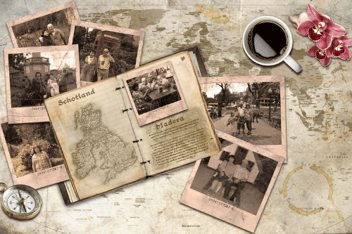7 Best DNA Testing Kits in 2024 for Uncovering Your Heritage
Embark on a transformative journey of self-discovery in 2023 as we delve into the significance of DNA testing kits for uncovering your heritage. Explore the evolving world of genetic exploration with the top 7 kits, offering a comprehensive look at ancestry, cultural roots, and genetic makeup.
The Significance of Heritage Discovery DNA Testing Kits
Understanding one's roots has always held a profound fascination for humanity. The surge in interest in ancestry, cultural heritage, and genetic lineage is met with the advancements in DNA testing kits. There are many source kits in the marketplace today making it more challenging on which one to us.
These kits have evolved over the years, transcending from basic lineage tracking to comprehensive genetic analyses. The desire to uncover the secrets encoded in our DNA has never been more accessible, making these testing kits a gateway to self-discovery.
The evolution of DNA testing kits has been remarkable. Initially designed to provide broad strokes of one's ancestry, they now offer intricate details about genetic makeup, connecting individuals with their past in unprecedented ways. The significance lies not only in satisfying curiosity but also in establishing a tangible link to our ancestors, fostering a sense of connection across generations.
Unveiling the Top 7 DNA Testing Kits for 2023
The landscape of DNA testing kits for heritage discovery presents a diverse array of options, catering to a broad spectrum of preferences and requirements. From AncestryDNA and 23andMe, which often lead in popularity, to MyHeritage DNA, Living DNA, and FamilyTreeDNA, each kit comes with its unique set of features and benefits.
Cost-wise, users can find options ranging from lower-priced kits like HomeDNA to higher-end ones like FamilyTreeDNA. The features provided span from comprehensive ancestry reports and DNA matching to health insights and detailed regional breakdowns. The benefits include access to extensive databases, collaborative family research tools, and the ability to delve into both recent and distant family history.
Ultimately, the best choice among these DNA testing kits depends on individual priorities. Whether seeking health-related information, detailed genealogical analysis, or a blend of both, users can navigate this rich tapestry of options to uncover their heritage in a way that resonates most with their unique interests and goals. To follow are the top 7 DNA kits available in the marketplace today:
AncestryDNA
AncestryDNA is a pioneer in the industry, offering an extensive database and detailed ethnicity estimates.Features: Comprehensive ancestry reports, DNA matches, family tree integration.
Benefits: Largest DNA database, historical records access, collaborative family research.
Cost: $79-$99 USD
23andMe
Known for health and ancestry insights, 23andMe provides a holistic genetic exploration experience.Features: Health reports, DNA relatives, trait analysis.
Benefits: Health risk assessments, diverse ancestry details, extensive user community.
Cost: $110 USD
MyHeritage DNA
MyHeritage DNA combines genealogy and DNA testing, offering a unique blend of historical and genetic exploration.
Features: Family tree tools, chromosome browser, ethnicity estimates.
Benefits: Global DNA database, historical records, advanced family matching.
Cost: $129 USD
LivingDNA
Living DNA specializes in detailed regional breakdowns, providing a granular view of one's genetic background.Features: Regional ancestry breakdowns, maternal and paternal line tracking.
Benefits: Highly detailed regional analysis, free family networks, ongoing updates.
Cost: $110
FamilyTreeDNA
Focused on genealogy, FamilyTreeDNA offers comprehensive tools for tracing family connections.Features: Y-DNA and mtDNA testing, surname projects, DNA matching.
Benefits: In-depth genealogical analysis, surname projects for collaboration.
Cost: $111 USD
GPS Origins/HomeDNA
GPS Origins stands out with its emphasis on pinpointing ancestral locations, offering a unique perspective on heritage.Features: Geographic population structure analysis, deep ancestral tracking.
Benefits: Precise ancestral locations, detailed migration patterns.
Cost: $199 USD
SELFDECODE
SelfDecode enters the realm of DNA testing with a focus on delivering personalized insights to individuals eager to understand their genetic makeup.
Features: SelfDecode stands out by offering a comprehensive view of genetic information, encompassing ancestry reports, detailed health insights, and exploration of distinctive traits within your genetic code.
Benefits: Empower yourself with actionable information from SelfDecode, assisting in informed decisions about health and lifestyle. Receive personalized recommendations for nutrition, fitness, and potential health risks.
Cost: $99 USD
As the popularity of DNA testing for heritage exploration soars, consumers are met with a myriad of choices, each promising to unravel the secrets encoded in their genetic makeup. Rankings based on efficacy, user reviews, and data accuracy can guide individuals toward reputable options, with AncestryDNA and 23andMe frequently recognized as leading choices. However, it's crucial for consumers to delve beyond the popularity rankings and recognize that not all DNA testing kits are created equal.
Differences in testing models among various kits can lead to significant variations in results. Individuals utilizing different testing services may find themselves presented with disparate ancestral narratives and, in some cases, entirely conflicting information. The need to verify the testing criteria becomes paramount. Each testing kit asserts its ability to examine specific DNA patterns and genes, making it imperative for consumers to understand the nuances of the testing methodologies employed by each service.
Understanding the unique characteristics that each DNA testing kit focuses on is essential for making an informed decision. AncestryDNA and 23andMe, despite their popularity, may prioritize different aspects of genetic exploration. AncestryDNA, for instance, boasts a vast database that aids in connecting individuals with relatives, while 23andMe is renowned for providing comprehensive health insights. Therefore, consumers should carefully evaluate their priorities, whether it be a focus on detailed ancestry reports, health-related information, or a combination of both, ensuring that the chosen DNA testing kit aligns with their specific objectives. In the labyrinth of genetic exploration, awareness of testing criteria emerges as a guiding light, helping individuals navigate the complexities and make choices that resonate with their unique interests and goals.
Exploring the Historical Tapestry of Heritage Discovery
The temporal dimension of heritage discovery through DNA testing adds a profound layer to the exploration of one's roots. These testing kits are not just windows into the past; they are intricate time machines that unveil the stories of both recent and distant generations. The ability of genetic testing to provide insights into family history, spanning across various epochs, empowers users to construct a comprehensive family tree. This temporal aspect allows individuals to trace the footsteps of their ancestors, understand migration patterns, and witness the historical events that shaped their familial heritage.
As users embark on this journey through time, DNA testing kits act as storytellers, revealing connections that bridge the gaps between generations. Beyond merely identifying ancestors, these kits provide a dynamic narrative, capturing the ebb and flow of genetic influences across the ages. Users can witness the evolution of their family tree, from ancient roots to recent branches, painting a vivid picture of how their genetic heritage has shaped and been shaped by the tapestry of human history. The temporal exploration facilitated by DNA testing transcends the static nature of traditional genealogy, breathing life into the ancestral stories that define who we are.
Ethical Dilemmas in Heritage Discovery: The Privacy Predicament
While the prospect of unveiling one's heritage through DNA testing is undeniably exciting, it brings to the forefront a pressing concern – the potential compromise of privacy. Users grapple with a discomforting reality: their genetic information, a unique and intimate blueprint, is shared with testing companies, raising valid questions about the possible misuse of this sensitive data. As the journey of self-discovery commences, it is paramount to delve into the ethical and privacy considerations surrounding the sharing of genetic information.
One of the unsettling aspects involves the potential intersection of DNA data with law enforcement or other agencies. As companies utilize aggregated data for research, ethical questions emerge about the use of genetic information without explicit consent, especially when it comes to legal investigations. The notion of inadvertently becoming a participant in a criminal investigation through shared genetic data poses a considerable ethical dilemma for users. Navigating these murky waters requires a keen awareness of privacy policies. Users are urged to carefully scrutinize and comprehend how their genetic data will be utilized by testing companies, ensuring transparency and ethical practices.
Empowering users to safeguard their privacy becomes a critical aspect of ethical DNA testing. Opting for testing kits that allow users to control the level of data sharing provides an added layer of protection. By making informed decisions about the extent to which their genetic information is disseminated, users can assert a degree of control over potential privacy breaches. As the landscape of heritage discovery continues to evolve, it is imperative to navigate these ethical considerations with vigilance, ensuring that the excitement of self-discovery does not come at the cost of compromising one's privacy and ethical principles.
Recap
In the evolving landscape of heritage exploration, the top 7 DNA testing kits for 2023 offer a diverse array of features and benefits, each catering to distinct preferences and curiosities. AncestryDNA and 23andMe, perennial favorites, stand out for their comprehensive ancestry reports, health insights, and extensive user communities. MyHeritage DNA, Living DNA, and FamilyTreeDNA provide unique strengths in family tree tools, detailed regional breakdowns, and in-depth genealogical analysis, respectively. GPS Origins offers a premium experience, pinpointing ancestral locations and migration patterns, while HomeDNA provides a more accessible entry point with optional health insights.
As users venture into the world of heritage discovery, it is imperative to consider the temporal dimension facilitated by these kits, allowing the weaving of a familial tapestry across generations. This temporal exploration unveils the interconnected stories of both recent and distant ancestors, painting a vivid picture of the evolution of genetic heritage through time.
However, the excitement of self-discovery is accompanied by ethical and privacy considerations. Users must navigate the complexities of sharing their genetic information with testing companies, understanding how data is used, and being vigilant about potential privacy breaches, particularly concerning law enforcement access. The discomfort associated with such considerations underscores the importance of selecting DNA testing kits that offer transparent practices and put users in control of their data sharing.
In this rich tapestry of DNA testing, costs vary from moderate to higher-end, features span from comprehensive ancestry reports to health insights, and benefits encompass collaborative family research to detailed genealogical analysis. The choice among these kits depends on individual priorities, ensuring that users can tailor their heritage exploration to align with their unique interests and goals. As the journey unfolds, it is essential to embrace the excitement of discovery while navigating ethical considerations, ensuring that the exploration of one's roots is both enriching and respectful of privacy.
To explore more insights on preserving family history, check out these related blogs.

Article by Carol Walsh
Carol Walsh is the CEO of Creative Roots, a professional genealogy company. She has a passion for preserving family history and storytelling. Carol's research methodology centers around fact-finding and publishing in a format that readers can use to preserve the stories. Her ultimate goal is to help families connect with their past and each other.




